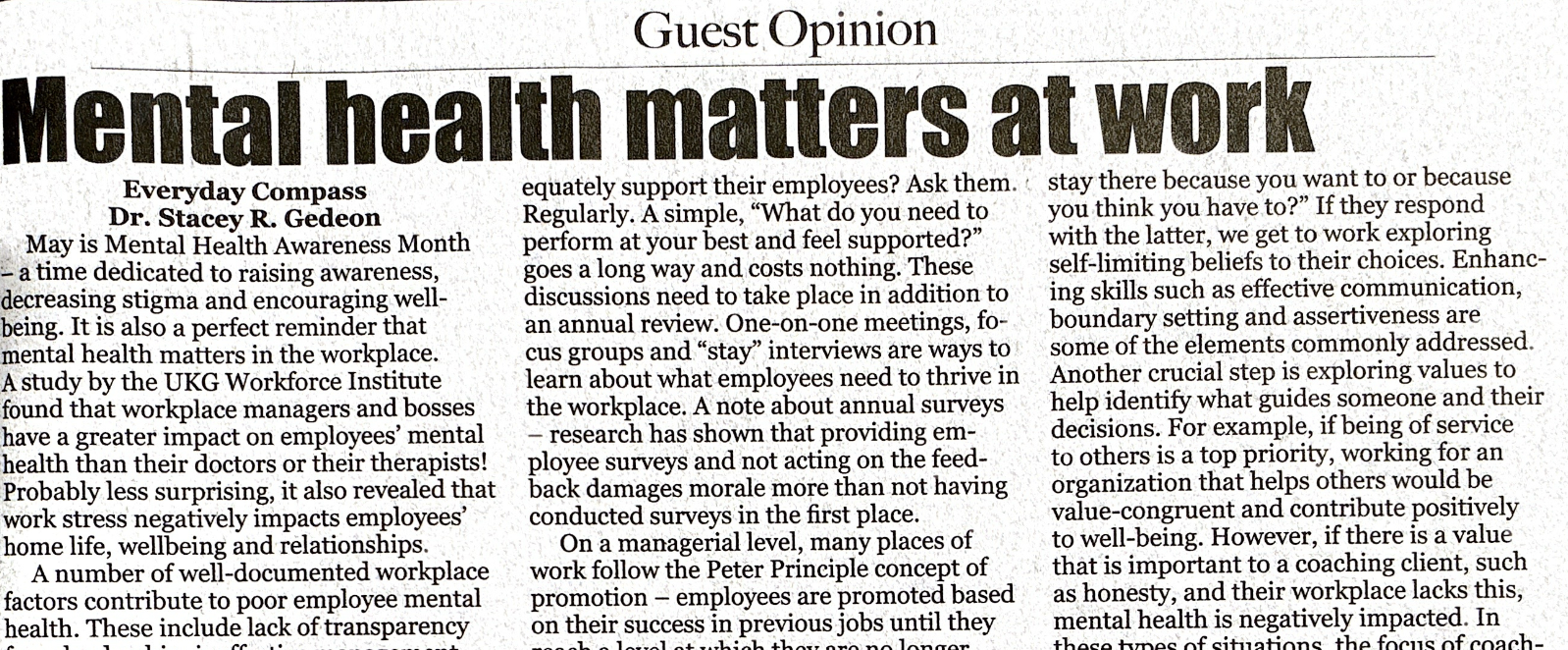Houghton Lake Resorter | Mental Health Matters at Work
May is Mental Health Awareness Month – a time dedicated to raising awareness, decreasing stigma, and encouraging well-being. It is also a perfect reminder that mental health matters in the workplace. A study by the Workforce Institute UKG found that workplace managers and bosses have a greater impact on employees’ mental health than their doctors or their therapists! Probably less surprising, it also revealed that work stress negatively impacts employees’ home life, wellbeing, and relationships.
A number of well-documented workplace factors contribute to poor employee mental health. These include lack of transparency from leadership, ineffective management, excessive micromanagement, and cultures driven by fear or intimidation. Other common issues include favoritism, broken trust, lack of psychological safety, being undervalued, limited growth opportunities, and leaders who engage in unpredictable or blindsiding behaviors. These contribute to poorer mental health and burnout for employees, as well as employee disengagement and turnover for organizations. It’s a lose-lose situation that results in well-being and financial costs for all involved. Fortunately, there are strategies that both employers and employees can implement to improve mental health in the workplace.
Ideally, businesses are actively engaged in ongoing measures to facilitate a healthy work environment. This must go beyond the occasional free pizza or extra casual wear day, however. Lately, a term called “muffin rage” has been circulating – it describes the frustration employees feel when leadership tries to address deeper workplace issues with empty gestures, like free snacks instead of real solutions. What can companies do to adequately support their employees? Ask them. Regularly. A simple, “What do you need to perform at your best and feel supported?” goes a long way and costs nothing. These discussions need to take place in addition to an annual review. One-on-one meetings, focus groups, and “stay” interviews are ways to learn about what employees need to thrive in the workplace. A note about annual surveys – research has shown that providing employee surveys and not acting on the feedback damages morale more than not having conducted surveys in the first place.
On a managerial level, many places of work follow the Peter Principle concept of promotion – employees are promoted based on their success in previous jobs until they reach a level at which they are no longer competent. This occurs because the skills in one job do not necessarily translate to another. For example, someone who excelled at sales does not inherently have the necessary skills to be a good leader. New leaders often feel unprepared, lack confidence, and inadvertently engage in poor leadership practices. One of the primary reasons new and existing leaders come to me for coaching is that they are struggling with employee disengagement, low morale and turnover. By assisting them with developing effective leadership skills, including emotional intelligence, they become equipped to excel in their role.
How about the employees’ role in their mental health at work? When coaching clients come to me for guidance on how to manage workplace stress, they have often “suffered in silence” for quite some time. Financial obligations, family commitments, and limited opportunities in rural settings are just some factors that keep people in a dysfunctional workplace.
One of my favorite questions to ask a coaching client is, “Do you stay there because you want to or because you think you have to?” If they respond with the latter, we get to work exploring self-limiting beliefs to their choices. Enhancing skills such as effective communication, boundary setting, and assertiveness are some of the elements commonly addressed. Another crucial step is exploring values to help identify what guides someone and their decisions. For example, if being of service to others is a top priority, working for an organization that helps others would be value-congruent and contribute positively to well-being. However, if there is a value that is important to a coaching client, such as honesty, and their workplace lacks this, mental health is negatively impacted. In these types of situations, the focus of coaching may shift to transitioning to a new role.
It is estimated that the average person spends 90,000 hours of their life at work. That’s about 1/3 of our lifetime! It’s no wonder that the workplace environment plays such an important role in our overall well-being. Mental Health Awareness Month can serve as an opportunity to take stock of your values and how they align with your workplace. Whether you are an employer or employee, with this information you can make impactful changes to improve your well-being.
Dr. Stacey R. Gedeon of Roscommon County is a clinical health psychologist and founder of SRG Healthcare Consulting and Professional Coaching, PLLC (srghcc.com). The content of this column is for informational purposes only and does not constitute professional advice or services in her capacity as a licensed psychologist. If you have suggestions for future topics on managing everyday challenges, please submit them to drgedeon@srghcc.com.

